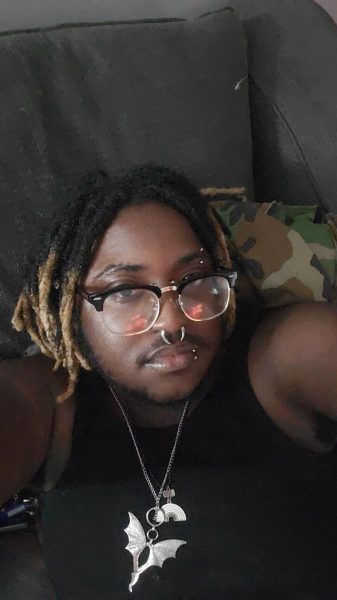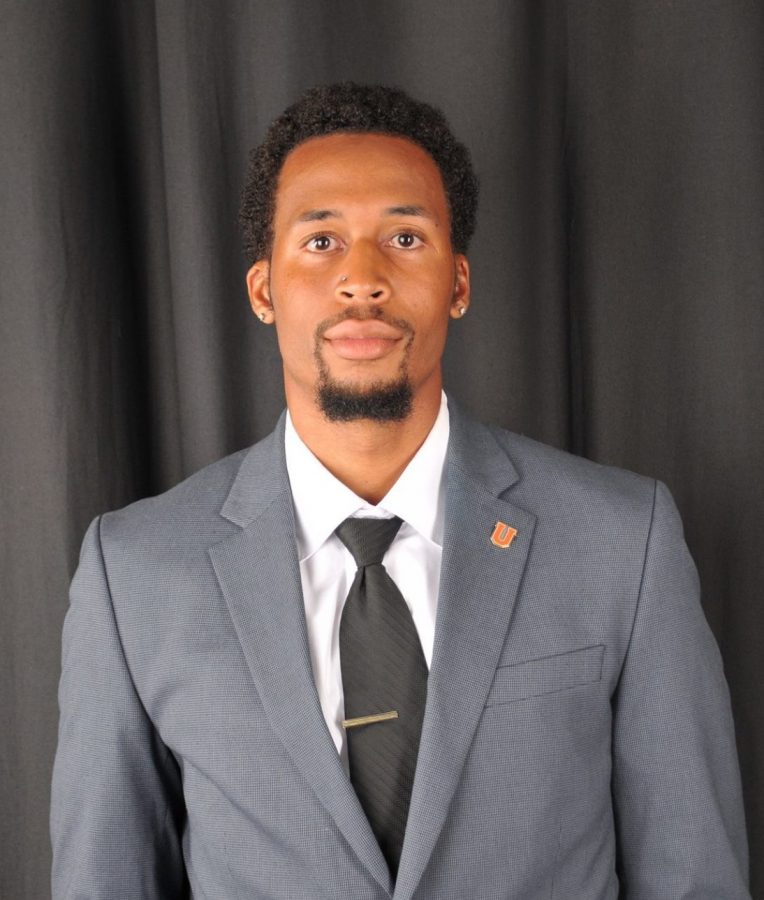Running Man
Brian Slater serves as Johnson’s Assistant Athletic Director for Diversity, Equity, and Inclusion, Sports Information, and Head Men’s and Women’s Track and Field Coach.
I really gotta do this whole thing?
Yes.
[My] title is too damn long. Let’s go ahead.
Tell me about where you grew up.
I don’t know, damn. I feel like I’m on the couch…
The Bronx, New York, is where I grew up. What can I tell you? Have you ever been to Juvie? That’s what growing up in the projects was like. It’s actually unique. The best part was, once I was allowed to go outside, every other day felt like a large block party. The entire neighborhood was outside. You played basketball from sunup to sundown. When the sun went down, you went to Times Square trying to find a date. No money in your pocket, hopping a train.
Tell me about your friends. What were they like?
Hilarious. Every single meeting or gathering was the hardest you’ll ever laugh in your life, even the smallest things. You can go months without speaking and it’ll always be like you saw them yesterday. Loyal.
Do you still talk to any of them?
Every single one.
Do you miss it? Home?
Yes and no. To visit, not to live there.
What brought you to Vermont?
The truth or the lie? The truth was I was broke and wanted to work in college again. There was a 3 to 5-year gap where I wasn’t a college coach or just working in the athletic department, period, and I missed that. I was sick of working dead-end job to dead-end job making $10.50 to $11 an hour.
How did you come to be Johnsons Assistant Athletic Director for DEI?
That was the initial position I applied for. As a college athlete, especially going to predominantly white colleges, I felt neglected. There wasn’t many resources, just the simple things of being able to watch BET, just to have the home comfort of watching your culture.
‘How can I put myself in a position where I can be the mentor I didn’t receive?’ That was my main thing. I feel like just being that, getting this opportunity, was the platform I needed to be able to provide resources, to speak up for the ones that are afraid to do so. That was why the position was interesting to me, and with the hopes of working my way into being a coach as well. I feel like I can be more effective as a coach, using athletics as that outlet to have those more uncomfortable DEI conversations.
Athletics is one of those places where as long as you can play, you’re accepted. It don’t matter what you look like, what you believe in, who your influences are…as long as you can perform, you’re accepted. So that’s that one avenue I wanted to bring in; everyone is welcomed.
What inspires you?
… Self growth. My own self growth inspires… I have to re-evaluate how to be better in order to get the work done.
Tell me something about you that might surprise people.
I’m a wrestling fanatic. Huge, like, I have monthly subscription t-shirts. WWE, everything. Huge fan.
What do you like about it?
The storyline. I treat it the way so many people treat soap operas. I’m watching the storyline; I’m watching how people create characters. Outside of the show itself, [WWE] as a company with the tremendous hours of community service they put in. They have something called Be a Star, which is an anti-bullying campaign. They work with Susan G. Komen, raising money for cancer awareness. They just started a diversity campaign where they’re working with small outreach programs. Trying to get more diversity into the fan base, getting black kids interested in watching it, even though they, they do have a very diverse fan demographic. That’s what got me into it.
If you could have dinner with any three people, dead or alive, who would it be and why?
Will Smith before the Oscar slap. That’s one. Um, Serena Williams … I’m stuck between Labron and Obama… Dr King.
Serena Williams to understand her cerebral, mental state of competition. Having the ability to be a fierce competitor, that on and off switch of ‘in this moment I’m very task oriented’ and how to stay there for a long period of time. I think she’s the best in the world at that.
Just consistency with Will Smith, the work that goes into any project, and before everything got exposed, how family-oriented he is
Dr. King to get more structure on social justice rights. Basically that ‘Social Justice for Dummies’ kinda thing. “Who, what, when, where, why.” Because it always feels like things aren’t working, no one’s listening. How to get people to listen, get them to understand, knowing that it’s a gradual movement and it’s not gonna be a “right now” quick fix.
What’s the most trouble you’ve gotten into as a kid?
Damn. I didn’t really get in trouble like that. I’mma say snatch and grab fruit from a fruit stand. I remember doing that.
What’s the best advice you’ve ever gotten?
Stop calling goals “goals” and change them to objectives.
What’s the worst advice?
Always choose the lesser of two evils. They’re both evil. You’re still picking evil.
What kind of music are you into? Name some artists.
Eric Bellinger, Anything R&B. Trevor Jackson, Jacob Latimore, Sevyn… Chris Brown obviously.
You’re gonna get cancelled for that one.
For what?
Chris Brown
Chris Brown? Why would I- oh.
What’s your most prized possession?
My national Championship metals “slash” grandfather’s military flag.
How did you come to be a part of the Virgin Islands Track and Field Federation?
Put this in quotations: “Got lucky.” A lot of being very persistent. The info was hard to find as far as who to contact. Finding what the qualifications were, proving worth… and I finally got contacted and was able to get the opportunity.
If you had to eat one thing for the rest of your life, what would it be, and who would you want to make it every single day?
Damn… damn…that’s hard. It’ll be my grandmother’s food from the Virgin Islands. I’ll eat that every single day. But you could quote, if my wife is reading the article, anything my wife makes. That way I don’t get in trouble.
I think it’s respectable to get your grandmother in a response.
Gotta throw the wife in there just in case.
What do you love about track and field?
That’s a complex question. It saved my life. It pushes you to levels you don’t think you can achieve. It’s that, that question that people ask, ‘Do you really want to wake up and run every single day?’ and understanding what you accomplished by going through that process. Waking up, going through the day, running whatever distance, whether it’s short or long. Getting through that, you can get through anything. Honestly, if you can get through a track practice, all the other obstacles you go through in life are less taxing.
Finish this sentence about yourself: “Not to brag, but…”
Not to brag but I have the best sneaker collection on campus.
What are some of your favorite shoes?
Jordan 1’s, everything.
When you were a kid, what did you want to be when you grew up?
And FBI agent, or a DEA Agent.
Why did you pursue coaching instead?
Passing information down. Becoming a coach, I’m an advocate of changing the culture of telling people they can’t do something instead of showing them how to get there, and making it a choice for people.
How do you balance your work here with being a national athlete?
Semi-retire. There isn’t any. It’s 24/7, there is no balance. There is no balance.
What is the best thing anyone’s ever said about you?
Jesus… it’s a positive and negative. Being selfless.
Is that also the worst thing someone’s said about you?
Yes. The most negative is that I’m not selfish enough.
When you’ve had a bad day, what’s the first thing you do when you get home?
Heh. Eat gummy bears. Haribo gummies. I got 8 bags from Sam’s Club, the industrial bags. So Haribo gummies and Family Guy. That’s the first thing I do.
How has working with student-athletes changed your perspective on life?
It hasn’t. I’m one of them. It just solidified that I was in the right spot.
What keeps you up at night?
Everything. What doesn’t keep me up at night? How to improve… self-reflection… yep.

Dayne (he/they) is a creative writing student from Connecticut. His zodiac sign is Pisces, which tells you everything you need to know.






